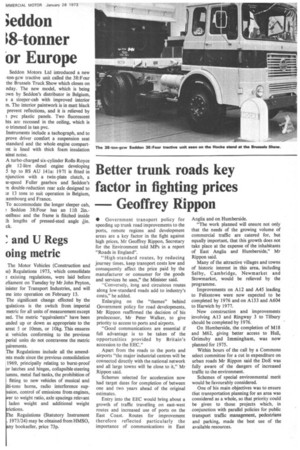Better trunk roads key factor in fighting prices — Geoffrey Rippon
Page 17

If you've noticed an error in this article please click here to report it so we can fix it.
• Government transport policy for speeding up trunk road improvements to the ports, remote regions and development areas are a key factor in the fight against high prices, Mr Geoffrey Rippon, Secretary for the Environment told MPs in a report "Roads in England".
"High-standard routes, by reducing journey times, keep transport costs low and consequently affect the price paid by the manufacturer or consumer for the goods and services he uses," the Minister said.
"Conversely, long and circuitous routes along low-standard roads add to industry's costs," he added.
Enlarging on the "themes" behind Government policy for road developments, Mr Rippon reaffirmed the decision of his predecessor, Mr Peter Walker, to give priority to access to ports and airports.
"Good communications are essential if full advantage is to be taken of the opportunities provided by Britain's accession to the EEC."
Apart from the roads to the ports and airports "the major industrial centres will be connected directly with the national network and all large towns will be close to it," Mr Rippon said.
Schemes selected for acceleration now had target dates for completion of between one and two years ahead of the original estimates.
Entry into the EEC would bring about a growth of traffic travelling on east-west routes and increased use of ports on the East Coast. Routes for improvement therefore reflected particularly the importance of communications in East Anglia and on Humberside.
"The work planned will ensure not only that the needs of the growing volume of commercial traffic are catered for, but equally important, that this growth does not take place at the expense of the inhabitants of East Anglia and Humberside," Mr Rippon said.
Many of the attractive villages and towns of historic interest in this area, including Selby, Cambridge, Newmarket and Stowmarket, would be relieved by the programme.
Improvements on Al2 and A45 leading to Felixstowe were now expected to be completed by 1976 and on A133 and A604 to Harwich by 1977.
New construction and improvements involving A13 and Ringway 3 to Tilbury should be completed by 1976.
On Humberside, the completion of M18 and M62, giving better access to Hull, Grimsby and Immingham, was now planned for 1975.
Within hours of the call by a Commons select committee for a cut in expenditure on urban roads Mr Rippon said the DoE was fully aware of the dangers of increased traffic to the environment.
Schemes of special environmental merit would be favourably considered.
One of his main objectives was to ensure that transportation planning for an area was considered as a whole, so that priority could be given to those projects which, in conjunction with parallel policies for public transport traffic management, pedestrians and parking, made the best use of the available resources.




























































































